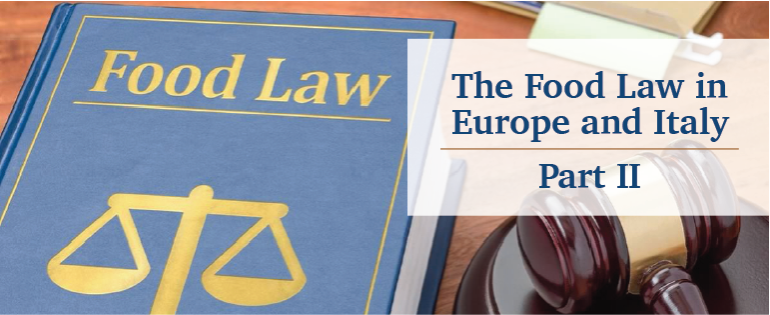The food law in Italy is subject to the European regulation, which is in general directly applicable in each Member State without need for any transposition, but also provides for internal rules with prevalent application function and for public Authorities within the national borders entitled to regulate the matters and the areas of competence left to the individual jurisdictions on the basis of the founding treaties as well as in application of the principle of subsidiarity.
The European legal framework in the food and wine industry (as discussed in PART I) is common to all Member States and therefore Italy is subject to the primary regulation provided by the European bodies which, where directly applicable, doesn’t need any transposition to enter into force within national borders, so that every citizen can ask the domestic courts for the application of European rules and the judge, in the event of a conflict between a European rule and a national rule, must set aside the latter. That’s why in the evaluation of the regulatory aspects related to the food and wine sector it is always necessary to refer to the European regulation first and then analyze the domestic legislation, as well as the competent Authorities’ provisions, in order to legally operate on the national territory.
EU sources and applicative rules within national borders
In those matters and areas of competence that are left to the individual jurisdictions on the basis of the founding treaties as well as according to the principle of subsidiarity, the domestic rules are completely in force and they must be observed by all operators involved in the food chain. The main sources in this sector which must be taken into duly consideration, also by an entrepreneur or investor of a third-country who wishes access this profitable market of over 440 million of potential consumers, refer not only to rules related to food safety, labeling and presentation to the consumer (including advertising), but also to all internal provisions provided by governmental bodies and regulatory agencies in relation to the whole food chain and the official controls as well.
The role of domestic Authorities
Summarizing, there are several entities at a national level entitled to establish application rules, conduct official controls and impose sanctions, as for example the Ministry of Health, the Ministry of Agricultural, Food and Forestry Policies and its internal department ICQRF (the Central Inspectorate for quality control on food products), N.A.S. (Carabinieri for the Protection of Public Health), but also the Ministry of Economic Development and the Italian Competition Authority in relation to certain aspects, in addition to a number of delegated bodies and agencies, and the local and regional governments within the limits of their local competences.
The agri-food crimes and the impact on the market
One of the most important aspects is doubtless represented by the agri-food crimes and their impact on the market since, due to the specificity of quality products made in Italy or imported from other countries (worthy of protection on the basis of the principle of mutual recognition or thanks to commercial agreements with third-countries) and their commercial value, frauds in food sector have grown significantly in the last decade. The national fundamental law on food safety dates back to 1962 but many rules have recently been adapted to the provisions of the Regulation (EU) 2017/625 on official controls and other official activities performed to ensure the application of food and feed law, rules on animal health and welfare, plant health and plant protection product. Moreover, a draft law on the reform of agri-food crimes is currently being discussed in the Italian Parliament and some topics that are essential for every business player, such as the administrative liability of companies provided in the Legislative Decree 231/2001 (stating that companies that are found liable may face penalties for crimes committed or attempted by directors or employees in the interest or to the advantage of the company) or the organisational, management and control model for business compliance shall be involved.
The future is here and now: digital in the food chain
Going digital is not only a common trend but it is a real opportunity in a number of industries, including agriculture and the entire cycle of the food chain. Integrating IoT, blockchain, Big Data, A.I. and more in general digital technologies starting from the production to the conservation, processing, packaging, control, distribution and sale of food will have a considerable impact on this sector both from a safety point of view and of course from a business perspective. And Italy seems to be reacting promptly to this stimulus with a variety of public and private initiatives such as studies, research, scientific observatories, surveys, incentives but also entrepreneurial investments to move forward innovative businesses in this field. Moreover, in line with the goals of the Sustainable Development Agenda 2030 and with the action plan provided by the European Green Deal, technology will certainly be one of the starring of this global challenge that must be absolutely won.
E-commerce to break down borders
E-commerce has grown fast in Italy in the last years and in 2020 the pandemic has further boosted online sales also in relation to foodstuffs and wines, so that numerous digital market-places and specialized platforms started operating, reaping successes even among the most conservative users and allowing many small producers to reach larger markets. However, there are specific provisions that it is important to consider in order to legally sell food or wine via the internet in Italy, and in the same way it should not be forgotten that the fraud prevention policy is also implemented with regard to food products commercialized online. Legal profiles that deserve to be carefully examined before entering into e-market involve on one hand advertising and unfair commercial practices, and on the other hand the set of pre-contractual and contractual information provided to the customers including guarantees, return of goods and of course data privacy policies. But problems may arise also from the application in the target jurisdictions of the legal terms provided from an operator located in a different country and that’s why it is necessary to take into consideration the internal legislation of each country of sale, also from a tax perspective of course, as well as to be duly knowledged about functioning of ADR and ODR where they are present.




